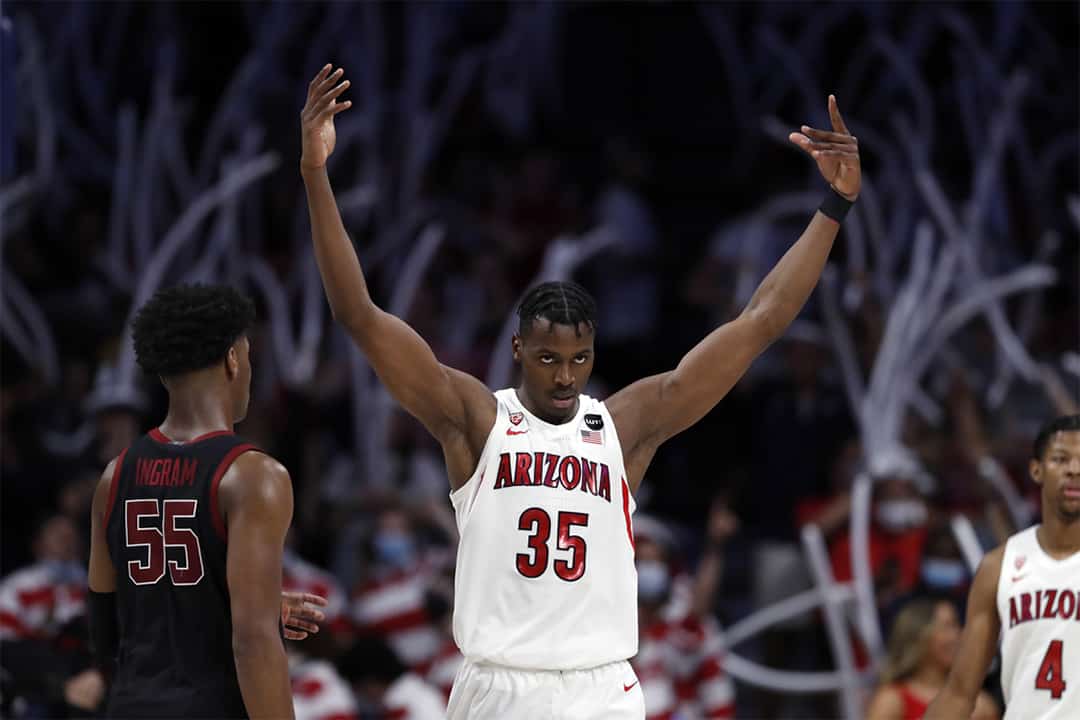On Thursday, Toronto Raptors fans went into draft night unsure of who would be joining, and possibly leaving, the team. Luckily, the evening was a simple draft and all fears of moves and changes were settled. For their only pick of the night, the Raptors chose Christian Koloko with the 33rd overall pick in the second round.
Koloko is a member of the Masai Ujiri-led Basketball Without Borders program. The 7’0”, 22 year old from Douala, Cameroon attended the University of Arizona during the National Collegiate Athletic Association’s (NCAA’s) 2021–2022 Pac-12 Conference. Koloko had an impressive breakout year, putting up great statistics on the first-placed team in the conference. The new Raptor averaged 12.6 points, 7.3 rebounds, 2.8 blocks, and 0.8 steals in the 2021–22 Pac-12 season.
Known for his defensive prowess, Koloko led the conference in blocks and defensive rating, and was second in rebounds, securing himself the conference’s Defensive Player of the Year award. Along with this achievement, Koloko went from an end of the bench player to becoming one of the best players at University of Arizona, playing in all 37 games of the 2021–2022 NCAA season. Koloko secured the conference’s Most Improved Player honour and was named to the conference’s first team by leading the conference in true shooting percentage, box plus/minus, offensive rating, and player efficiency rating.
Though, there are some concerns about Koloko and his gameplay. The first issue is his fouls. Regardless of how careful a defender plays, drawing fouls is an inevitability. However, Koloko did not just have the most fouls in the 2021–2022 Pac-12 Conference — he also did not have a single game in the season without a foul. At face value, this does not only just suggest that he plays an aggressive game, but it could also mean that he lacks the discipline not to draw fouls.
The second concern is his scoring. During his three-year college career, Koloko attempted only five shots from behind the arc. To make matters worse, only 10 of his field goals came outside of the paint. Ultimately, this means that Koloko, in his current condition, presents to be another ‘tall’ man who relies on the post to score. However, his role with the Raptors is unclear.
The Raptors in the 2021–2022 season found success by following what seemed to be a ‘jack of all trades’ model, focusing on building a team of ‘two-way wings’ — players who can score efficiently and also be versatile on the defensive end. With a 7’0” build and a 7’5” wingspan, Koloko instantly joins the team as the tallest person, and fits in with the Raptors’ goals.
Due to his weak shooting and defensive focus, the assumed ceiling for a player like Koloko
would be playing a role similar to Clint Capela on the Atlanta Hawks. Capela has become the
Hawks’ defensive stalwart to accommodate for the poor defense of some teammates. Thus, the best-case scenario for Koloko would be to act as an anchor to allow the Raptors’ guards to be more aggressive on the perimeter, similar to his role in college.
However, one thing to note is that this role is not enough. With his current skill set, Koloko fits the defensive obligations for the team but he does not address the team’s flaws or cover for the weak points in his teammates at this moment. Over the 2021–2022 season, the Raptors were 20th in points, 29th in assists, and second in turnovers. With the average of only 12.6 points and more turnovers than assists, Koloko is not the solution that the Raptors need.
Despite these issues, the Raptors do not seem to worry about Koloko’s potential to become a member of the core. In his post-draft media availability, General Manager Bobby Webster pointed out that Koloko has seen incredible improvement from his 2017 participation in Basketball Without Borders to his breakout year at Arizona State. A similar statement was made by Raptors’ Head Coach Nick Nurse, who said that Koloko’s free throw percentage — which was seventh in the 2021–2022 Pac-12 Conference — was an indicator that consistency in hitting the three-point shot will not be a problem to develop.
If there is anything that should be exciting, it is the expected connection between Koloko
and members of the Raptors organization. Pascal Siakam and Koloko are both from Douala,
Cameroon and are success stories from the Basketball Without Borders program.


